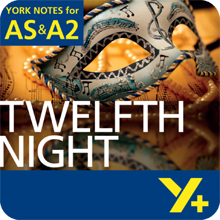Your Assessment
Read through the answer below and decide what grade to give it. Use the Hints & Tips to help you make your assessment.
Hytner’s statement about “Twelfth Night” suggests that Shakespeare was at the zenith of his powers in writing the play, bringing a diverse set of elements together to create a dramatic masterpiece. Yet his statement itself suggests an imbalance: ‘unrequited love’, sadness and spite are all negative concepts – and only ‘joy’, the final element of the four, can be seen as positive.
To a large extent, the respective weight we give to each aspect depends on interpretation. Jane Shilling’s review in the “Daily Telegraph” of Edward Hall’s all-male version of the play in 2013 suggested that it was too cruel, and should have been more compassionate. But, perhaps Hall was right. After all, this is a play in which for much of it, a sister believes her twin to be dead, in which another woman mourns for a dead brother, and in which a set of what we might call ‘playground bullies’ in the form of Sir Toby, Feste and, even, Maria, perhaps go too far in their treatment of Malvolio, something Olivia acknowledges at the end: ‘He hath been most notoriously abused’ (Act V Scene 1).
It is certainly true that melancholy casts a long shadow over the action, not least in the music and songs that permeate the play. The drama begins with music which has a ‘dying fall’ (Act I Scene 1), and while we might consider this music to reflect Orsino’s exaggerated sense of romance, it nevertheless sets the tone – the metaphorical ‘dying’ is very appropriate here. Most notably, Feste’s song in Act II Scene 3, which interestingly accompanies Sir Toby and Sir Andrew’s drinking session, reflects that, ‘What’s to come is still unsure … Youth’s a stuff will not endure. This ‘carpe diem’ notion is perhaps not surprising in a time when average life expectancy was around 35 years. This might explain the hurried way in which Olivia weds a man she hardly knows, and Orsino weds a girl who until recently he believed to be a man.
Melancholy also rears its head in odd lines and phrases. Sir Andrew’s touching ‘I was adored once, too’ (also in Act II Scene 3) hints at a sadness behind the silliness. Sebastian’s saviour, Antonio, ‘relieved him with such sanctity of love’ (Act III Scene 4), but at the end of the play we are left no wiser as to his future given he is Orsino’s captive.
Interpretation is also key in the portrayal of Malvolio. We can weigh on the one hand his pettiness, and self-love, and apparent attraction to the financial rewards of being Olivia’s husband (‘the full prospect of my hopes’ as he says in Act III Scene 4), against the sustained imprisonment and verbal torture by Feste. Even Malvolio’s name invites interpretation and in linguistic terms has unstable meaning: in the Italian, it means ‘Ill will’, but is it his ‘ill will’ towards others, or those of others towards him?
There is undoubtedly joy to be had in the gulling scene. Few audiences would not laugh at Malvolio’s appearance and dialogue with Olivia in Act III Scene 4, but even here Shakespeare himself interrogates the meaning of ‘sad’; when Olivia says she sent for Malvolio upon a ‘sad occasion’, his response is that he ‘could be sad’ given how tight the cross-garters are on his legs! Our joy in the comic action of the play is always undercut by a sense of melancholy, but also suggests that while our first instinct may be to laugh, Shakespeare is questioning what – or more accurately whom – we are laughing at. Tim Crouch’s one-man show from the Edinburgh Festival 2011, ‘I, Malvolio’ asks at one point, ‘Is that what you find funny?’ – making the audience ask whether madness, decency and even love can truly be considered comical. Hytner is right that there is a balance of the four elements in the play, but with each production, the balance shifts from one to another.
